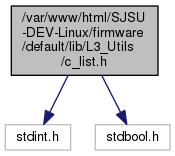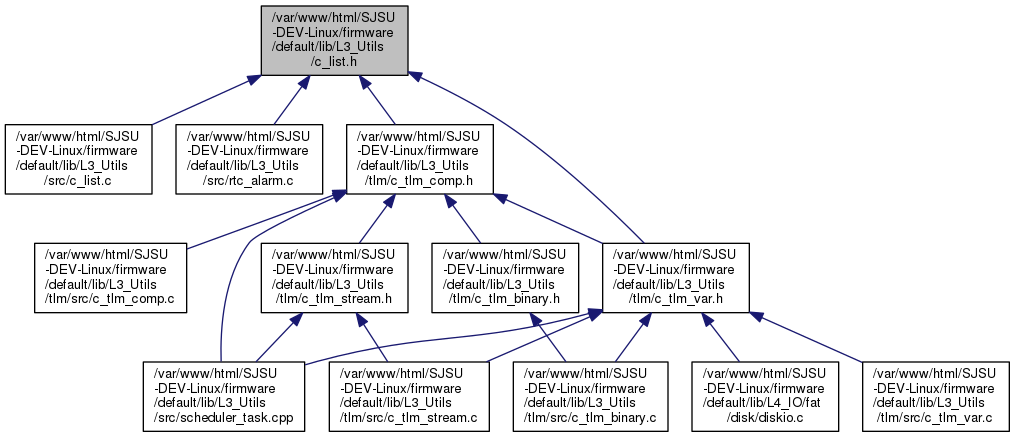#include <stdint.h>#include <stdbool.h>

Go to the source code of this file.
Typedefs | |
| typedef bool(* | c_list_callback_t) (void *elm_ptr, void *arg1, void *arg2, void *arg3) |
| typedef void * | c_list_ptr |
Functions | |
| c_list_ptr | c_list_create (void) |
| bool | c_list_delete (c_list_ptr list, c_list_callback_t delete_callback) |
| uint32_t | c_list_node_count (const c_list_ptr list) |
| void * | c_list_get_elm_at (c_list_ptr list, uint32_t index, void **hint) |
| void * | c_list_find_elm (c_list_ptr list, c_list_callback_t callback, void *arg1, void *arg2, void *arg3) |
| bool | c_list_delete_elm (c_list_ptr list, const void *elm_ptr) |
| bool | c_list_for_each_elm (const c_list_ptr list, c_list_callback_t func, void *arg1, void *arg2, void *arg3) |
| bool | c_list_insert_elm_beg (c_list_ptr list, const void *elm_ptr) |
| bool | c_list_insert_elm_end (c_list_ptr list, const void *elm_ptr) |
Detailed Description
Linked list implementation in C. This is a SINGLY linked list with the head and the tail pointers, therefore insertion at either at the head or the tail will be quick.
- Note
- This linked list doesn't copy data internally; it only keeps the link aka pointer to your data that you need to maintain yourself. In other words: Make sure the linked data doesn't go out of scope otherwise the list will basically contain 'dangling' pointer(s).
Example code of list of integer pointers :
Typedef Documentation
| typedef bool(* c_list_callback_t) (void *elm_ptr, void *arg1, void *arg2, void *arg3) |
INCLUDES COMMON
| typedef void* c_list_ptr |
Typedef of the c-list pointer type. User shouldn't need to know about the internal structure of the list.
Function Documentation
| c_list_ptr c_list_create | ( | void | ) |
Creates a linked list structure
- Returns
- Heap allocated list pointer.
| bool c_list_delete | ( | c_list_ptr | list, |
| c_list_callback_t | delete_callback | ||
| ) |
Deletes the linked list and calls your del() function for each element.
- Parameters
-
list The linked list pointer. delete_callback This can be NULL if you just want to free up the list and its nodes and you don't want to use the delete callback. If you provide this callback, then you will receive a callback with the elm_ptr and you decide what to do with the pointers you added to the list.
| bool c_list_delete_elm | ( | c_list_ptr | list, |
| const void * | elm_ptr | ||
| ) |
Deletes an element by the pointer
- Parameters
-
list The list to delete the node from elm_ptr Pointer to the element that should be deleted. Note that this will delete the first element it finds and will not remove all instances if duplicate elements were added.
- Returns
- true if element was found and was deleted.
| void* c_list_find_elm | ( | c_list_ptr | list, |
| c_list_callback_t | callback, | ||
| void * | arg1, | ||
| void * | arg2, | ||
| void * | arg3 | ||
| ) |
Finds an element in the list. When your callback returns false, this function will return that element back. If your callback returns true and list iteration finishes, NULL pointer is returned.
- Parameters
-
list The list to iterate callback The callback function. arg1 arg2 arg3 The arguments to pass to your call-back function.
| bool c_list_for_each_elm | ( | const c_list_ptr | list, |
| c_list_callback_t | func, | ||
| void * | arg1, | ||
| void * | arg2, | ||
| void * | arg3 | ||
| ) |
Iterates your list's element(s)
- Parameters
-
list The list to iterate func The callback function. The list will iterate as long as this callback function returns true. When the callback function returns false, the iteration stops and immediately returns false. If iteration finished and your callback always returned true, then this function will also return true. arg1 arg2 arg3 The arguments to pass to your call-back function.
- Returns
- true if entire list was iterate without your callback returning false
If your list contains integers, you can use the following to check for duplicates :
| void* c_list_get_elm_at | ( | c_list_ptr | list, |
| uint32_t | index, | ||
| void ** | hint | ||
| ) |
Gets the linked list element at the given index.
- Parameters
-
list The list pointer index The index location with bounds of 0 to c_list_node_count() hint Can be NULL if you don't want to use it. You can use the hint to iterate through the elements faster if you are using a for loop. See example below :
- Returns
- The element pointer or NULL if out of bound element is accessed
| bool c_list_insert_elm_beg | ( | c_list_ptr | list, |
| const void * | elm_ptr | ||
| ) |
List insertion functions Inserts your data pointer to the list
- Parameters
-
list The list to insert a new node elm_ptr Pointer to your data.
- Note
- The data at elm is not copied internally, only the pointer is copied. This pointer thus, should not go out of scope after you add to the list.
| bool c_list_insert_elm_end | ( | c_list_ptr | list, |
| const void * | elm_ptr | ||
| ) |
| uint32_t c_list_node_count | ( | const c_list_ptr | list | ) |
- Returns
- the number of items in the list.


 1.8.11
1.8.11